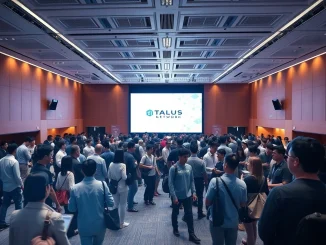
In a bold move signaling a proactive stance on the burgeoning digital asset landscape, South Korea’s Financial Services Commission (FSC) Chairman, Kim Byoung-hwan, has passionately advocated for the accelerated implementation of crypto regulation. Speaking at a recent financial forum, Chairman Kim underscored the critical need for a well-defined regulatory framework to govern virtual assets, emphasizing that this must be underpinned by transparent principles and a clear strategic direction. Are you ready to understand how this might reshape the future of Korean crypto?
Why is Swift Crypto Regulation Crucial for South Korea?
Chairman Kim Byoung-hwan didn’t mince words when highlighting the urgency. He stressed that developing the necessary functions, organizational structures, and robust systems is not just important, it’s paramount. This isn’t merely about keeping pace with global trends; it’s about preemptively addressing potential risks and fostering a stable environment for innovation. But what exactly makes this so time-sensitive?
- Protecting Investors: The volatile nature of cryptocurrencies necessitates strong investor protection mechanisms. A clear regulatory framework can mitigate risks associated with fraud, market manipulation, and illicit activities.
- Ensuring Financial Stability: As virtual assets become increasingly intertwined with traditional finance, their stability directly impacts the broader economic system. Regulation is vital to prevent systemic risks.
- Fostering Innovation within Boundaries: Smart regulation doesn’t stifle innovation; it channels it constructively. By setting clear rules, the FSC aims to create a level playing field where innovation can thrive responsibly.
- Global Alignment: International standards for virtual assets regulation are evolving. South Korea’s proactive approach positions it as a responsible global player in the crypto space.
It’s not just about laying down rules; it’s about building a resilient and forward-looking financial ecosystem. Think of it as constructing a robust highway system for the digital economy – you need clear lanes, traffic rules, and safety measures to ensure smooth and secure flow.
Deep Dive into the FSC’s Approach to Virtual Assets Regulation
The FSC’s approach is methodical and phased. Chairman Kim outlined that the commission is meticulously examining the integration of crypto into the existing financial framework. This isn’t a rushed decision; it’s a carefully considered evaluation process. What does this examination entail?
| Evaluation Area | Focus |
|---|---|
| Integration with Traditional Finance | Assessing the interconnectedness of crypto markets with banks, securities firms, and other financial institutions. Understanding potential contagion risks. |
| System Stability | Analyzing the resilience of the financial system to shocks originating from the crypto market. Stress-testing scenarios and identifying vulnerabilities. |
| Consumer Protection | Evaluating current measures for investor protection in the crypto space. Identifying gaps and areas for improvement in safeguarding consumer interests. |
| Market Integrity | Examining the prevalence of market manipulation, insider trading, and other illicit activities in the Korean crypto market. Developing mechanisms for market surveillance and enforcement. |
Based on these thorough evaluations and subsequent discussions, the FSC is poised to move into the second phase of crypto regulation legislation. This phased approach demonstrates a commitment to adaptability – adjusting the pace and specifics of regulation as needed, informed by ongoing analysis and dialogue.
What are the Potential Benefits of Clear Virtual Assets Regulation?
While regulation might sometimes be perceived as restrictive, in the context of virtual assets, it unlocks a plethora of benefits. Beyond just mitigating risks, effective regulation can be a catalyst for growth and mainstream adoption. Let’s explore the upside:
- Increased Institutional Investment: Clarity in regulation provides institutional investors with the confidence to enter the crypto market. Large-scale institutional capital can fuel significant market growth and maturity.
- Enhanced Market Legitimacy: Regulation lends credibility to the crypto industry. It signals that virtual assets are being taken seriously by authorities, reducing the perception of them as a fringe or risky asset class.
- Innovation and Growth: A well-defined framework encourages responsible innovation. Companies can build and expand their crypto businesses with a clear understanding of the rules of the game.
- Consumer Trust: Robust consumer protection measures build trust in the crypto market. This trust is essential for broader public adoption and participation.
- Reduced Regulatory Arbitrage: Harmonized or at least clearly defined virtual assets regulation across jurisdictions can reduce opportunities for regulatory arbitrage, fostering a more level global playing field.
Challenges on the Horizon: Navigating the Complexities of Crypto Regulation
Implementing effective crypto regulation is not without its challenges. The very nature of cryptocurrencies – decentralized, borderless, and technologically complex – presents unique hurdles for regulators worldwide. What are some of the key challenges the FSC and other regulatory bodies face?
- Technological Complexity: Understanding the underlying technology of blockchain and cryptocurrencies is crucial for crafting effective regulation. Regulators need to stay abreast of rapid technological advancements.
- Cross-Border Nature: Cryptocurrencies operate globally, while regulation is often jurisdiction-specific. International cooperation and harmonization are essential to prevent regulatory arbitrage and ensure consistent standards.
- Balancing Innovation and Risk: The challenge lies in creating regulations that mitigate risks without stifling innovation. Finding the right balance is a delicate act.
- Enforcement Difficulties: The decentralized and pseudonymous nature of some cryptocurrencies can make enforcement of regulations challenging. Developing effective monitoring and enforcement mechanisms is critical.
- Evolving Landscape: The crypto space is constantly evolving. Regulations need to be flexible and adaptable to keep pace with new technologies, use cases, and market developments.
Actionable Insights: What Does This Mean for the Future of Korean Crypto?
Chairman Kim’s statements are a clear indicator that Korean crypto market is on the cusp of significant regulatory developments. For businesses and individuals involved in virtual assets in South Korea, here are some key takeaways:
- Prepare for Increased Compliance: The second phase of legislation will likely bring more detailed compliance requirements. Businesses should proactively prepare for stricter KYC/AML procedures, reporting obligations, and operational standards.
- Stay Informed and Engage: Keep a close watch on announcements and consultations from the FSC. Engage in industry discussions and provide feedback to shape the regulatory framework constructively.
- Focus on Transparency and Security: Prioritize transparency in operations and robust security measures. These will be increasingly important in a regulated environment.
- Seek Expert Advice: Consult with legal and compliance professionals specializing in virtual assets to ensure you are prepared for the evolving regulatory landscape.
Conclusion: A Pivotal Moment for Crypto Regulation in South Korea
Chairman Kim Byoung-hwan’s strong advocacy for swift crypto regulation marks a pivotal moment for the virtual asset industry in South Korea. The FSC’s commitment to a phased, principle-based approach signals a move towards a more mature and regulated market. While challenges remain, the potential benefits of clear and effective regulation – from increased institutional investment to enhanced consumer protection – are substantial. As South Korea navigates this crucial phase of regulatory development, the global crypto community will be watching closely, learning valuable lessons from their proactive and considered approach. The era of virtual assets regulation is not just coming; it’s actively being shaped, and South Korea is determined to be at the forefront.



